- Home
- Nancy Pickard
Twilight
Twilight Read online
LOOK FOR ALL OF
NANCY PICKARD’S
CELEBRATED JENNY CAIN MYSTERIES
CONFESSION
BUT I WOULDN’T WANT TO DIE THERE
I.O.U.
BUM STEER
DEAD CRAZY
MARRIAGE IS MURDER
NO BODY
SAY NO TO MURDER
GENEROUS DEATH
AND
THE WHOLE TRUTH
AVAILABLE IN HARDCOVER
AVAILABLE FROM POCKET BOOKS
Praise for the latest Jenny Cain mystery from Nancy Pickard
TWILIGHT
“Nancy Pickard writes deliciously frightening mysteries. TWILIGHT is a suspenseful, emotionally engrossing novel that will grab you and never let you go. This fast-paced read is full of heart-wrenching passions and poignant emotions…. Mystery at its best!”
—Mary Jayne Farpella, Affaire de Coeur
“This long-running series is consistently rewarding.”
—The Purloined Letter
“Compared … to Sara Paretsky and Sue Grafton …. Pickard is best. She deals with the same weighty subjects and women’s issues; her books are just more fun.”
—Jan Maxwell Advent, News-Sentinel (Knoxville, TN)
“Surprising…. Jenny’s telling observations on love and marriage, family and friendships and small-town politics add texture to this well-wrought puzzle….”
—Publishers Weekly
“A mix of characters … keeps everything in an uproar as the book rushes to its surprise conclusion. Pickard’s latest mystery will have fans raising Cain while awaiting her next adventure.”
—Hollis E. Kerfoot, The Post and Courier
“A nicely paced, nicely plotted mystery that makes a perfect read for a chilly fall evening.”
—Emily Melton, Booklist
Books by Nancy Pickard
Generous Death
Say No to Murder
No Body
Marriage Is Murder
Dead Crazy
Bum Steer
I.O.U.
But I Wouldn’t Want to Die There
Confession
Twilight
Published by POCKET BOOKS
For orders other than by individual consumers, Pocket Books grants a discount on the purchase of 10 or more copies of single titles for special markets or premium use. For further details, please write to the Vice President of Special Markets, Pocket Books, 1230 Avenue of the Americas, 9th Floor, New York, NY 10020-1586.
For information on how individual consumers can place orders, please write to Mail Order Department, Simon & Schuster Inc., 100 Front Street, Riverside, NJ 08075.
The sale of this book without its cover is unauthorized. If you purchased this book without a cover, you should be aware that it was reported to the publisher as “unsold and destroyed.” Neither the author nor the publisher has received payment for the sale of this “stripped book.”
This book is a work of fiction. Names, characters, places and incidents are products of the author’s imagination or are used fictitiously. Any resemblance to actual events or locales or persons, living or dead, is entirely coincidental.
POCKET BOOKS, a division of Simon & Schuster Inc.
1230 Avenue of the Americas, New York, NY 10020
www.SimonandSchuster.com
Copyright © 1995 by Nancy J. Pickard Trust
All rights reserved, including the right to reproduce this book or portions thereof in any form whatsoever.
For information address Simon & Schuster Inc., 1230 Avenue of the Americas, New York, NY 10020
ISBN: 0-671-78290-8
eISBN: 978-1-451-60289-0
First Pocket Books printing August 1996
10 9 8 7 6 5 4 3 2
POCKET and colophon are registered trademarks of Simon & Schuster Inc.
Cover design by William Sloan/Three
Printed in the U.S.A.
Dedication
Dedicated to my Friday friends, without whom no week is complete: Janice, Randy, Sally, Kevin, and Fran.
I offer heartfelt thanks to Cuky Choquette Harvey, who dreamed one night of Jenny Cain, a fortune-teller, a fair, and a theft, and who generously gave her dream to me.
I am indebted to the following books and their authors for information and inspiration: The Woman’s Encyclopedia of Myths and Secrets by Barbara G. Walker; The I Ching in the Richard Wilhelm translation rendered into English by Gary F. Baynes; A Guide to the I Ching and The Philosophy of the I Ching by Carol R. Anthony; The Book of Runes by Ralph H. Blum; First Steps in Starting a Foundation by John A. Eadie; and The Festival Hopper’s Guide to New England by Darrin and Julie Craig.
There really is an old-fashioned “Dime Store” in my hometown. Its wonderful atmosphere and its hilly old wooden floor inspired its namesake in this novel. All of the characters and events I have created are imaginary, however. “God’s Highway” follows its haunted path only in my fantasies.
As always, there would be no book without the perception, patience, and skill of my editor in shining armor, Linda Marrow, and my friend and agent, Meredith Bernstein.
Prologue
THERE WAS A STRANGE NIGHT LAST WINTER WHEN MY HUSBAND AND I were coming home from a party at the other edge of town. Geof was driving the Jeep, his car. I was beside him, in the passenger seat. We were both awake, we were sober, but it seemed for a moment like a dream or a hallucination, all the same.
It was after midnight, closer to one o’clock.
We weren’t talking, and the radio wasn’t on, but it wasn’t exactly quiet in the car. There was engine noise, and the blast of the heater—it was hovering around freezing outside—and the moan of the tires over the pavement. I guess there may have been a whining of the wind, too, but I don’t think I was consciously aware of it. There wasn’t time to notice it, or to label it: “wind.” It’s only there in my memory, or my imagination. I do vaguely remember the sound of something slapping rhythmically against the car body, maybe one of the mud flaps.
My ankles were cold, I recall that, for sure.
And I was tasting onion, from a potato chip dip at the party. It’s funny, really, how the taste of onion dip and the memory of cold ankles are the sensory cement that glue together my memory fragments of that uncanny night.
I recall that Geof had his gloves off, both big hands on the wheel, his handsome forty-year-old face looking relaxed, but tired. He is a cop, a lieutenant in the Port Frederick, Massachusetts, police department, who gets periodically and thoroughly sick of people. Although he has a gregarious nature, it was unusual for him to agree to go out with friends on a weekend night when the truth was that he’d rather be home watching a movie with me.
I was leaning my head back against the seat, staring out of the windshield at the yellow lines in our headlights. Every now and then I glanced at my husband, feeling a warm and quiet pleasure in his company. I was deeply aware of how much more safe and secure I felt traveling down the highway with him at one o’clock in the morning than I would have felt by myself. And I was thinking that it was good of him to have gone with me to the party—I would not have insisted; we are enormously close, but we are not clones, after all. I could have respected his desire to burrow in at home, and I would still have had fun at the party, on my own. But I didn’t have to. And so, I found myself savoring the delicious feeling of being encapsulated in a cozy, moving island with him as we traveled toward home.
Suddenly, I sat up and looked back down the highway.
“Was that snow on that truck?”
“What, Jenny?”
That’s all I had time to say—and he to respond—when it hit.
Wham. Snow dumped on us from above, as if the gods had suddenly opened their fists. Big, gloppy flakes immediat
ely pasted themselves to our windshield. Our headlights were full of swirling white. The air, the highway, the sides of the road, the sky—everything changed color. One minute, there was black sky above us; the next minute, there was blowing white. When I turned around in the passenger seat of our Jeep, I was amazed that I could still see dry black pavement and brown grass at the sides of the highway behind us. And then even that vision of safety was gone, and we were in the middle of an honest-to-God, slick and dangerous snowstorm.
“Damn it!” was my husband’s response.
He shifted to a lower, slower gear, cautiously using the clutch, avoiding the brakes. Then he switched on the windshield wipers. I fiddled with the defroster in an attempt to blow more hot air on the windshield, which was rapidly crusting over. We were in the Jeep, so I wasn’t really worried, but I didn’t like it, either. Suddenly, I wanted nothing more than to be home.
And then again, just like that, things got worse.
A lot of red brake lights up ahead warned us to slow … slow … slow … until we found ourselves stopped dead in the right-hand, westbound lane of the highway. Suddenly there was nobody going the other way. And there were cars cautiously forming a line behind us.
Geof released a string of expletives.
“I don’t fucking believe this.”
I knew what was coming next.
There was a police-band radio and even a cellular telephone in the Jeep, so he could have turned to either of those to find out what was going on up the road ahead of us—an accident, probably—but I knew he wouldn’t settle for that. He’d have to get out of the Jeep. Walk down the side of the road, until he disappeared from my view in the snow, and satisfy himself with a firsthand view of the situation. He’d want to find out if they needed help, a hand from a fellow cop, a little traffic control … or worse … picking up bodies, helping paramedics, taking names.
He started pulling on his gloves.
“What do you want me to do?” I asked him.
He looked around, through the windows at the swirling white, as if seeking an answer for my question. There was a red stop sign at an intersection about ten yards ahead of us, and we could just barely make out the end of a gravel driveway a few feet beyond the sign. Past the driveway, all was black and white, because the highway dropped off down a hill, and then rounded a bend that straightened out onto a little bridge.
“When the traffic starts to move again,” Geof said to me, “why don’t you pull into that driveway and wait for me, Jenny? Don’t come looking for me, because there may not be any safe place for you to stop the car down there. I’ll walk back and find you.” He glanced at me for assent. “All right?”
“Yes.”
Always prepared, Geof had heavy black rubber boots in the back, which he located and began to pull over his good brown loafers. From the floor behind us, he also pulled out a ski mask that covered everything but his eyes and his mouth, and he put a battered old winter cap on over that. He’d worn a long, stylish black overcoat to the party, so that was sufficient to keep the rest of him protected. When he was fully ready, he opened his door, letting a whirl of cold air and snow into the car.
“You know where we are?” he asked me.
He appeared weird and sinister in his stocking cap—which was navy blue with knitted red circles around the holes for His eyes and mouth—and slightly ridiculous, when I considered the whole ensemble.
I nodded. “Crowley Creek’s just over the hill down there,” I said. “You know who lives at the end of that driveway, Geof. It’s the Kennedys, Ardyth’s folks, the people who own the Dime Store.” He and I both had gone through the Port Frederick, Mass., public schools with their daughter, though I knew her better, since she and I were the same age. Ardyth Kennedy and I had never been friends, exactly, but at least her parents would recognize me, if I had to ring their bell, seeking refuge. “If I start to freeze to death, I’ll go knock on their door.”
He leaned over to kiss me through the red hole for his mouth, so that I felt as if I were being kissed by four lips. Then he was gone, a large black shadow bent into the wind at the right side of the road, quickly disappearing from my view.
It took forty minutes for the traffic to begin to move again.
And still, I didn’t know what had actually halted us. I could have turned on the police radio, or placed a phone call and found out. I still don’t know why I didn’t do either of those logical and natural things, but I didn’t. I simply sat alone in the silent car and passively waited to find out. Maybe I didn’t want to hear the sense of crackling urgency that would have pelted me from the radio, not while I knew that my husband was down there.
I just wanted to wait, calmly. And then to see him.
When the car ahead of me inched forward, I did, too. I merely paused at the stop sign, however, because I didn’t want to take the chance of sliding or stalling. Then I cautiously turned into the gravel driveway, bumping over a stripped Christmas tree that lay across it. I assumed that the Kennedys had put it out for the trash men to pick up the next day. This was only ten days past Christmas, mind you, only four days—or nights—into January.
I pulled out of the way of the traffic and turned off the engine.
After another ten minutes passed and Geof still didn’t reappear, I decided that the Kennedys’ house looked warm and cozy and well-lighted at the end of the drive, and that maybe Nellie and Bill Kennedy might provide a cup of coffee for a weary traveler.
And that’s where Geof found me a half hour later.
I was holding a cup of hot cider in my hands, while Nellie anxiously paced her kitchen, stopping frequently to pull back her curtains and stare into the storm, both of us wondering what had happened … and if anybody was hurt or killed … and whether we knew any of them. Bill was asleep upstairs, but Nellie had been awakened by the terrible sound of vehicles crashing together, she told me. It was she who’d called 911.
“Three-car pileup,” Geof told us, as he stamped his boots on Nellie’s welcome mat. “And a pickup truck. Two people pretty seriously injured, the others banged up, but nobody’s dead. They got off lucky. One of those damn fools ran the stop sign and skidded down the hill into the other lane and hit the pickup truck, and then everybody else piled into them. It was a damned mess. Thank you, Mrs. Kennedy.”
She was coming toward him with a cup of cider.
It had involved nobody that any of us knew.
“I’m so relieved,” Nellie said.
We left her kitchen a half hour later—when it was nearly three o’clock in the morning—and made it safely home an hour after that. The next day, when we found out that one of the accident victims had died, we took it kind of personally, having been there. But then it was over, apparently, and that was all there was to it.
Except, that things connect—winter snow, spring rains, autumn leaves—in ways we never suspect and nature never intended. And now I think that it may have been some unconscious connection with me … and that night … that caused Nellie Kennedy to break down in front of me, ten forgetful months later. After that—after Nellie cried—it seemed as if everything started to crash together, like vehicles sliding horribly out of control on a slick highway …
1
TEN MONTHS LATER, THE MONTH WAS OCTOBER.
This time, Nellie and I were holding cups of hot coffee, not cider, and we were seated in her office at the back of the Dime Store, not in the kitchen in her home. And this time, it was all business for me, instead of for my husband.
My business is foundations, not the undergarments, but the charitable kind, like the Ford Foundation or the Carnegie, only smaller. At the time of this meeting with Nellie Kennedy on a cool Thursday morning in October, my history was that I had been employed for years as the director of the old-line foundation in town, the Port Frederick Civic Foundation, but I’d left them a couple of years before, in order to “explore my options.” One of those options turned out to be starting my own foundation, with the passionate
help of some of my best friends.
Because of that, something wonderfully serendipitous had evolved between Nellie Kennedy and me after that strange, sad, and snowy night in January. She and I had made a connection that night that was turning out to serve both of us profitably and well. To me, she was no longer Mrs. Kennedy who lived out near Crowley Creek, nor was she merely the mother of a girl I’d gone to school with, or even just the owner of a locally famous emporium.
She was “Nellie” now, instead of “Mrs. Kennedy.”
“Nellie, I owe you,” I said to her, that day, ten months later, without the slightest idea of what was about to come barreling down on me. I only knew it was a beautiful morning, and I liked and respected this woman enormously, and I was happy to be in her company. Smiling, half teasing, I added, “I won’t go so far as to say that anything I have is yours …”
The tense, tired face of the plump woman seated beside me relaxed slightly into a faint smile.
“… but I will say—no, I will swear it, vow it, pledge it—that if there’s anything I can do for you, any favor, all you ever have to do is ask.”
Nellie Kennedy stared at me for a moment, absorbing my heartfelt promise. Then, suddenly, this woman who had only previously touched me to shake my hand to close a sale, grabbed my wrist. At fifty-six she was nearly twenty years older than me, but her grip was as strong as a farmhand’s.
“Do you mean that, Jenny? Because there is somebody you could help, as a favor to me.”
She stared intensely into my face, her deep, intelligent, Irish-green eyes compelling my attention, my assent.
Lord! I’d fully meant my pledge of indebtedness. In the last few months this woman had saved my bacon more times than if I were a pig at a slaughterhouse. She’d saved me thousands of dollars, she’d saved me time. As the director of my own private foundation, I was also in charge of the first annual Port Frederick Autumn Festival, which we were sponsoring. For her part, Nellie was the owner of the one store in town that would let me order vast quantities of supplies at nearly wholesale. Without Nellie Kennedy and the Dime Store, ten days from now we might be raking leaves on the town common instead of hosting a spectacular festival there. That was the connection we’d made that night in her kitchen over cider: I’d buy thousands of dollars’ worth of supplies from her; she’d cut me the best deals.

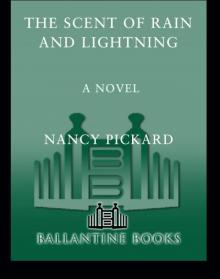 The Scent of Rain and Lightning
The Scent of Rain and Lightning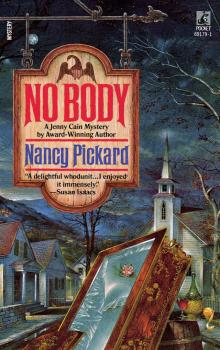 No Body
No Body The Secret Ingredient Murders: A Eugenia Potter Mystery
The Secret Ingredient Murders: A Eugenia Potter Mystery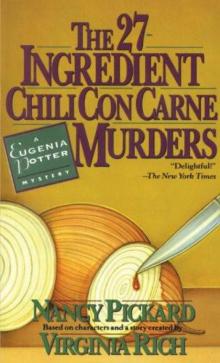 The 27-Ingredient Chili Con Carne Murders: A Eugenia Potter Mystery
The 27-Ingredient Chili Con Carne Murders: A Eugenia Potter Mystery Twilight
Twilight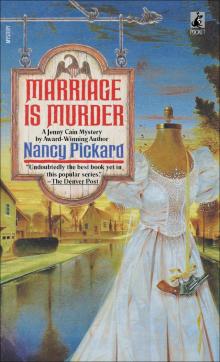 Marriage Is Murder
Marriage Is Murder I.O.U
I.O.U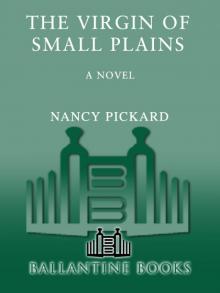 The Virgin of Small Plains
The Virgin of Small Plains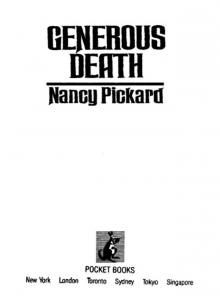 Generous Death
Generous Death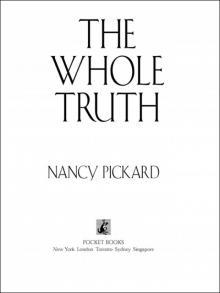 The Whole Truth
The Whole Truth The Blue Corn Murders
The Blue Corn Murders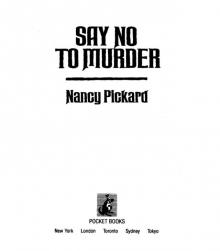 Say No to Murder
Say No to Murder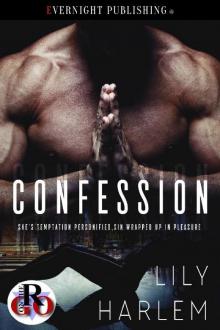 Confession
Confession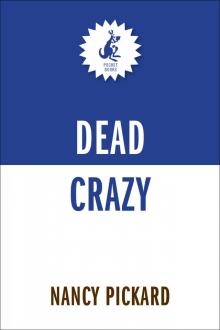 Dead Crazy
Dead Crazy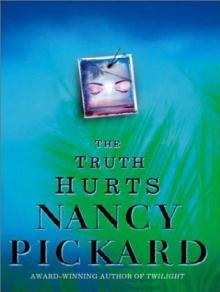 The Truth Hurts
The Truth Hurts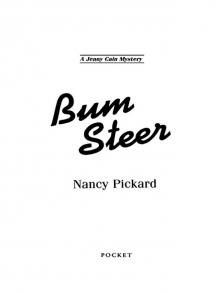 Bum Steer
Bum Steer